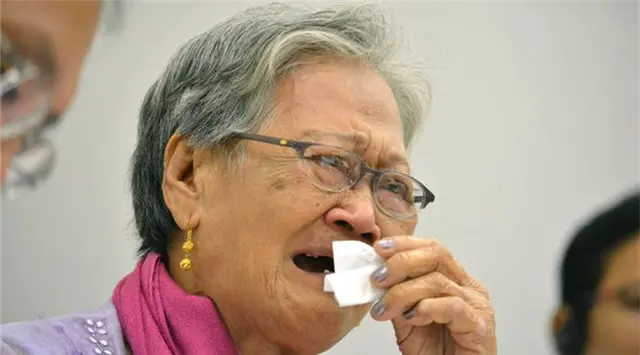(Yong Soo Lee, a Korean woman forced into sexual slavery by Japanese forces, in Virginia to raise awareness on behalf of fellow survivors. Website.)
(THE VOX) InAugust1910,theEmpireofJapanformallyannexedwhathadoncebeenthesovereignnationofKorea.Itisonlynow,overacenturylater,thatJapanandKoreahaveformallyreconciledoneofthedarkestlegaciesofthatera:the1930sand'40srecruitmentofKoreanwomenandgirlsassexslavesknownas"comfortwomen."
Japan'simperialisminKoreaendedin1945,andJapanre-normalizedrelationswithSouthKoreain1965,butthepsychologicalwoundsitinflictedtherehaveneverfullyhealed.JapanandSouthKoreahave,eversince,beenlockedinasortofunspokennegotiationoverthispast;overhowtorememberthischapterintheirsharedhistory—aquestionthatisstillunresolvedwithinJapanitself.
Today,JapanandSouthKoreahavereachedanofficialagreementthattheysaywillclosetheiryears-longdisputeoverJapan'sguiltandresponsibilityforenslavingKoreansas"comfortwomen."
Butthisisaboutmuchmorethanjustthecomfortwomenissue.It'saboutlitigatingwhatkindofcountryJapanisallowedtobe,bothinthehistorybooksandintheworldtoday.It'saboutshapingthe21stcenturyorderinAsia.Andthestoryofwhythisishappeningatall—andwhyonlynow,nearlyacenturylater—goesbacktosomegraveandlong-lastingAmericanmistakesinitswartimeoccupationofJapan.
Whatare"comfortwomen"?
(A Korean survivor of wartime Japanese sexual slavery weeps at a conference of survivors (KAZUHIRO NOGI/AFP/Getty))
In1931,ImperialJapaninvadedManchuria,launchingwhatmanyAsiansconsiderthestartofWorldWarTwo.AstheJapaneseImperialArmypushedintoChinaandthenSoutheastAsia,itbeganestablishing"comfortstations"initsmilitarybasesandalongthefrontlines.
The"comfortstations"werenamedfortheirofficialpurpose:tocomfortthebraveJapanesesoldiersfightingfortheempireabroad.Theyaresometimesdescribedaslikebrothels,butthat'snotwhattheywere.Infact,theywerecampsinwhichtheJapanesemilitaryimprisonednon-Japanesewomenandgirls,whomJapanesesoldierswouldroutinelyrape,oftendozensoftimesperday.
Japanfirstrecruited"comfortwomen"largelyfromKoreancommunities,bothinJapanandinKoreaitself.ItusedKoreanpolicetorecruitthewomenandgirls,andwouldoftenlurethemwithfalsepromisesofagoodjobinthecity.Thewomenwerethenshippedtomilitarybases,oftennearthefrontlinesinChina,wheretheywerelockedupinroomsonlythree-by-fivefeet,andrapedbyasmanyas60to70soldierseveryday.
ThroughouttheWar,astheJapanesearmyspreadacrossAsia,itforciblyseizedtens(orpossiblyhundreds)ofthousandsofwomenandgirlsfromthecountriesitinvaded.InKorea,itdroppeditscharadeofpeacefullyrecruitingwomen,andbeganovertlyraidingvillages,attimeskillingfamilymemberswhotriedtostopthem.Accordingtoa1996UnitedNationsreport,theraidsoftentargetedschoolsandmanyofthevictimswerechildrenaged14to18—sothatthemilitarycoldensuretheirvirginity.
ThecomfortstationswereaboutmorethanjustprovidingJapanesesoldierswithsex.TheImperialJapaneseArmywassteepedinfascistmilitarismandatwistedobsessionwithracialhierarchies,whichledittosystematizemanyabuses,includingthemassrapeof"inferior"womenandgirlsintheforeignlandsitconquered,andthisispartofJapan'slargerpracticesofusingwarcrimessuchasmassrapesandmassmurdersofcivilians.
The"comfortwomen"controversyisn'tjustaboutthewar—it'saboutwhathappenedafterthewar
InbothGermanyandJapan,thealliesheldwarcrimestribunals,meanttopunishthoseresponsiblebutalsotoforceanhistoricalaccounting,sothatthevictimsmightfeelthey'dreceivedjustice.But,inJapan,thewarcrimestribunalwasdominatedbyWesternpowers,andfocusedoverwhelminglyonJapanesecrimesagainstWesternpeopleandinterests.Onlythreeofthe11judgeswereAsian,thoughmostofJapan'svictimshadbeenAsian,andnoneofthosethreewereKorean.
Itwasn'tjustHirohitowhoescapedfulljustice.Itwas,insomeways,theJapanesepeoplethemselves.BoththeAmericanoccupiersandtheimperialremnantsallowedorevenencouragedapolitefictionthatJapaneseabusesinAsiahadn'tbeensobad,orhadbeenlimitedtoafewbadapples.AsthehistorianHerbertBixwrote,theAmericaneffortstopreserveHirohitoandbrushhiscrimesundertherug"hadalastingandprofoundlydistortingimpactonJapaneseunderstandingofthelostwar."
AllofthishasrobbedKoreansandChineseandmanyotherAsiannationsofasensethatjusticewaseverreallydone.It'spartofwhy75-year-oldJapanesewarcrimesdon'tfeelliketheyhappened75yearsago,butratherareacontinuinginsultandinjusticethatpersists,awoundthathasneverbeenallowedtohealandisre-openedeverytimeaJapanesepoliticianexpressesadmirationforimperialleadersordownplaysimperialabuses.Tothem,it'snotinthepastatall.
How"comfortwomen"becamesuchabigissue,andwhyit'shappeningnow
(Korean survivors of Japanese wartime sexual slavery at a 1995 rally for justice near the Japanese embassy (CHOO YOUN-KONG/AFP/Getty))
Itwasn'tuntil1991,whenaKorean"comfortwoman"survivorspokeout,thatotherscameforwardaswell.Theyweren'tjustconfrontingJapan,buttheirownsocietiesthathadforcedthisissueintothedark.Sincethen,morehavespokenout—andKoreans,nowmoresociallyliberal,havelistened.
In1993,onlytwoyearslater,theJapanesegovernmentformallyapologizedwiththeKonostatement,acknowledgingitsguiltandthegovernment'swrongdoing.Butthe1993apologyimmediatelybecomeapoliticalcontroversyinJapan—withJapaneseconservativescondemningit,disputingJapaneseguilt,andmakingsurethatthisKoreanwoundstayedopen.
There'sanotherimportantdimensiontoallthis:thereisstillasubstantialKoreanminorityinJapan.AndthoseKoreansstillendurediscriminationandracismtoday.It'sverydifferentfrom,say,JewsinGermanywhocanexpectnotjustequaltreatmentbutrobustlegalprotectionsandsocialnormsthatforbidanti-Semitism.AnditcontributestoasenseamongKoreans,fairlyorunfairly,thatJapanisunrepentantandperhaps,insomeways,unchanged.
 简体中文
简体中文



